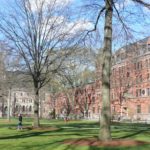How to Write the NYU Essays 2025-2026
NYU has one supplemental prompt for all applicants this year, and an additional prompt for Dr. Martin Luther King, Jr. Scholars Program applicants.
Although the prompts are technically optional, NYU’s prime location in the heart of downtown New York City, campuses all across the globe, and affiliation with excellent graduate schools in a range of subjects make it highly competitive to gain admission. So, we strongly encourage you to take advantage of this opportunity to share something new about yourself with admissions officers.
Read these examples of past NYU essays about diversity and “Why NYU?” written by real students to inspire your writing!
NYU Supplemental Essay Prompts
All Applicants
Prompt (optional): We are looking for students who want to be bridge builders—students who can connect people, groups, and ideas to span divides, foster understanding, and promote collaboration within a dynamic, interconnected, and vibrant global academic community. We are eager for you to tell us how your experiences have helped you understand what qualities and efforts are needed to bridge divides so that people can better learn and work together. (250 words)
Please consider one or more of the following questions in your essay:
- Tell us about a time you encountered a perspective different from your own. What did you learn—about yourself, the other person, or the world?
- Tell us about an experience you’ve had working with others who have different backgrounds or perspectives. What challenges did your group face? Did you overcome them, and if so, how? What role did you try to play in helping people to work together, and what did you learn from your efforts?
- Tell us about someone you’ve observed who does a particularly good job helping people think or work together. How does this person set the stage for common exploration or work? How do they react when difficulties or dissensions arise?
MLK Scholars Applicants
Prompt (optional): In under 250 words, please share how you have demonstrated your commitment to the legacy of Dr. King’s ideals of “Beloved Community” as evidenced through academic achievement, research, or service. (250 words)
All Applicants Prompt (optional)
We are looking for students who want to be bridge builders—students who can connect people, groups, and ideas to span divides, foster understanding, and promote collaboration within a dynamic, interconnected, and vibrant global academic community. We are eager for you to tell us how your experiences have helped you understand what qualities and efforts are needed to bridge divides so that people can better learn and work together. (250 words)
Please consider one or more of the following questions in your essay:
-
Tell us about a time you encountered a perspective different from your own. What did you learn—about yourself, the other person, or the world?
-
Tell us about an experience you’ve had working with others who have different backgrounds or perspectives. What challenges did your group face? Did you overcome them, and if so, how? What role did you try to play in helping people to work together, and what did you learn from your efforts?
-
Tell us about someone you’ve observed who does a particularly good job helping people think or work together. How does this person set the stage for common exploration or work? How do they react when difficulties or dissensions arise?
This prompt is a sort of blend between two common essay prompt archetypes: the Diversity prompt and the Impact on Community prompt. The admissions team is explicitly looking for bridge builders—students who can bring people together across differences and foster collaboration.
The school wants to know how you engage with perspectives different from your own. They want to see whether you can work collaboratively across different kinds of divides (cultural, social, intellectual, ideological, etc.). Share what you’ve learned from moments of tension, disagreement, or difference. How might you embody the role of a bridge builder on their campus?
To begin planning for your essay, think about the experiences you’ve had that might make for a strong response. When have you worked with people from very different backgrounds (e.g., school clubs, sports, internships, volunteer projects, international exchanges)? During these periods of your life, did you ever face a disagreement that forced you to pause, listen, and rethink? What was the outcome?
It’s important to not just think about conflicts and their resolutions, but to also reflect on the idea of building bridges between people. During these experiences you’ve had, have you seen someone—like a coach, teacher, family member, or mentor—model “bridge building” well? How have you learned from them?
Beyond thinking about specific role models, more abstractly, what qualities do you think make for a good bridge builder? Patience, empathy, curiosity, humor, problem-solving, or something else entirely? How do you show those qualities in action? How might you carry these attributes forward into college?
Once you’ve reflected on these questions, it’s time to begin planning your specific topic. You might want to share a specific story or snapshot—a clear moment that shows you personally encountering differences (rather than vague and abstract statements about bridge-building).
In recalling this event, be sure to show what you learned about yourself and others. Describe how you bridged the divide (e.g., listening, reframing, mediating, or introducing new ideas). Connect your story to the NYU campus community you want to join. Be authentic! Write about an experience that genuinely challenged you—not just something generic like “I worked with different people and it was great.”
Here are some hypothetical student examples to show you how you could tackle this kind of prompt:
- Sofia, Model UN delegate: At a regional debate, she worked with peers from across the world who saw climate policy differently. She struggled at first but learned to build common ground by focusing on shared values like protecting future generations.
- Ana, community volunteer: While tutoring immigrant children, she had to collaborate with parents who spoke little English. She learned patience and the importance of non-verbal communication, discovering new ways to connect beyond language barriers.
- Malik, robotics team member: His team included both experienced coders and beginners. Frustration rose when tasks were unevenly distributed, but he created a peer “mentorship circle” to help everyone contribute. He came to learn that leadership is more about empowering than directing.
As you can see, varied experiences from a wide array of backgrounds can lend themselves to this kind of prompt well. There isn’t really a right or wrong experience to write about, so long as it’s genuine, there are lessons to be learned from it, and it responds to what the prompt is asking for. Let’s take a look at both weak and strong excerpts that Malik could potentially write for this prompt.
Bad Example
“In the debate club, I often hear different opinions. I always listen respectfully and share my thoughts. I believe everyone has something to contribute. This has taught me to be open-minded and work with others. I want to bring this same attitude to college.”
Why this doesn’t work: It’s vague, it could apply to just about any applicant, it offers little detail, and it lacks storytelling or personal insight.
Good Example
“When my robotics team was split between veteran coders and nervous first-years, tensions quickly flared. Meetings turned quiet as beginners hesitated to contribute. Eventually, I suggested pairing each new member with a mentor for side projects. Slowly but surely voices began to emerge—our robot’s navigation system was coded entirely by a freshman who had once been too shy to even make a suggestion. Helping contribute to the new working style of the group taught me that bridge building isn’t about being the loudest leader, but is rather about creating structures where everyone feels ownership. At NYU, I want to keep building those bridges so collaboration thrives, even when differences feel intimidating.”
Why this works better: It’s concrete, shows the student’s role, highlights growth, and connects to potential future contributions.
Be aware that the above excerpts are much shorter than the space you’re given to work with. You should strive to provide even more detail and insight in your response.
Finally, let’s talk about some common mistakes that students make when addressing prompts like this one.
Mainly, students can sometimes be too generic in their response—for example, saying “I like working with diverse groups” without an actual story. On the other side of things, some students make the mistake of overstating their heroism. Don’t make yourself the sole “savior” who solved everything and provided the whole resolution. You want to focus on collaboration, not self-glorification.
While it might be tempting to do so, be sure not to avoid tension. Bridge-building implies that there are challenges to overcome, so don’t sanitize your story. Show that there was conflict and that it was resolved with growth in the end. And finally, don’t choose a cliché! Be careful with overused contexts like “working with kids on a service trip,” unless you are sure that you can bring a fresh and specific angle.
MLK Scholars Prompt (optional)
In under 250 words, please share how you have demonstrated your commitment to the legacy of Dr. King’s ideals of “Beloved Community” as evidenced through academic achievement, research, or service. (250 words)
Before you even start thinking about a response to this prompt, you should research Dr. Martin Luther King, Jr., his work, and his message, and his notion of the “Beloved Community.” Because this program is known to be selective, you’ll want to show the admissions officers that you truly understand the program’s mission and spirit.
The primary goal of the program is: “to develop scholars who strive to realize Dr. King’s ‘Beloved Community’ and who embody ‘a love-centered way of thinking, speaking, acting, and engaging that leads to personal, cultural and societal transformation’ (The King Center).”
By doing your research first, you can strategically choose experiences that show that you’re the kind of student who will take full advantage of this program, rather than accidentally selecting anecdotes that may be strong on their own, but don’t reflect the program’s values.
While you should definitely do your own research on this topic, for a rough overview, the “Beloved Community” is a society based on justice, equal opportunity, and love for all, free from poverty, hunger, and hate. You’ll need to provide specific examples of how you’ve embodied these ideals in your academic life, research, or service efforts.
The prompt provides three domains in which you may have demonstrated your commitment to the ideas of the “Beloved Community.” Let’s take a look at each one and think about some things you may have done in each:
- Academic Achievement: Have you taken courses or completed projects that address social justice, equality, or community building? Did you participate in discussions, presentations, or papers that promoted these ideals?
- Research: Have you researched issues like racial equality, social justice, or community service? How did your findings contribute to promoting Dr. King’s vision?
- Service: What volunteer work or community service have you done that aligns with the ideals of the “Beloved Community”? How did your actions directly contribute to fostering a more just and loving society?
A good response will provide specific examples—using concrete examples is the best way to demonstrate your commitment. Rather than just saying “I’ve researched social justice,” explain what your project was and why you chose to get involved.
Also aim to draw a connection to Dr. King’s ideals. Clearly link your particular actions to Dr. King’s vision of the “Beloved Community.” Explain clearly and in detail how your work promotes justice, equality, and love—don’t leave anything up to inference.
Finally, highlight the impact of your work. Describe how your actions contributed (and continue to contribute) to a positive change in your community or field of study.
Notice that each of the above points can lead seamlessly into the next to establish a strong narrative flow. Begin with anecdotes, examples, and details about the experiences you’ve had. After describing these experiences, connect them to the ideals of Dr. King’s “Beloved Community.” Finally, highlight how your personal impact within the broader experience demonstrates your own commitment to these ideals.
Let’s take a look at some hypothetical student examples to show you the different forms a response could take.
- Student A: A student who took an advanced sociology course and chose to focus his capstone project on the effects of systemic racism in education. He analyzed how inequities in school funding perpetuate the achievement gap, and ended up presenting his results to a local school board while advocating for reforms that align with Dr. King’s ideals of equal opportunity.
- Student B: A student passionate about biology who joined a community health initiative in her neighborhood, which provides free health screenings and education about preventive care. She can explain how this work helped address healthcare disparities by directly supporting the health and well-being of underserved populations, in line with Dr. King’s vision for a more equitable society.
- Student C: A student who organized a series of community dialogues between local police officers and students after tensions arose in their town. They could discuss how these conversations aimed to foster mutual understanding and reduce conflict, and thus embodied Dr. King’s principles of nonviolence, reconciliation, and community building.
Take a look at examples of weak and strong responses, along with some explanations as to why they are weak and strong, respectively.
Bad Example: “I’ve always believed in the importance of equality and treating others with respect, which is why Dr. King’s ideals resonate with me. Throughout high school, I took my studies seriously because I knew education was a powerful tool for change. I’ve also volunteered occasionally, helping out at food banks and participating in community clean-ups. I think it’s important to be a good person and do what you can to help others, whether it’s through academics or service. In the future, I hope to continue Dr. King’s legacy by being kind, respectful, and supportive of those around me, doing my part to make the world a better place.”
Why this example doesn’t work: This response is vague, without any specific examples of how the student has actively worked to advance Dr. King’s vision. It mentions general values like kindness and respect, but doesn’t demonstrate a clear connection to the ideals of the “Beloved Community” in particular, or describe how the student made their community a more equitable place.
Here’s a stronger example with more direction:
Good Example: “For a final history paper in high school, I explored the legacy of redlining in urban communities. My research revealed how discriminatory housing practices have perpetuated economic inequality, limiting opportunities for minority communities.
Inspired by Dr. King’s vision of a ‘Beloved Community,’ I turned my studying into action by volunteering with a nonprofit that assists first-time homebuyers in historically marginalized neighborhoods. My role involved guiding families through the complexities of securing a mortgage, understanding property taxes, and maintaining financial stability. I also collaborated with the organization to develop workshops that educate prospective homeowners about their rights and resources, empowering them to overcome systemic barriers.
By helping these families achieve homeownership, I aimed to break the cycle of poverty that redlining had enforced for generations. One particularly meaningful experience was seeing a single mother of two receive the keys to her first home, as I knew that this would create a more stable and hopeful future for her children.
This work deepened my understanding of economic injustice and reinforced my commitment to fostering a society where everyone has the opportunity to thrive. I believe that by empowering individuals with the tools they need to succeed, I am contributing to the realization of Dr. King’s dream of a just and equitable community.”
Why this works: This response has a specific, detailed description of how the student’s academic work ties into their service efforts. It clearly connects to Dr. King’s ideals of addressing economic injustice and promoting equality, and shows that the student made a tangible impact on their community. There is also emotional depth, which makes the response even more compelling.
There are some mistakes you’ll want to avoid making when responding to this prompt. Most importantly, don’t write a vague response—don’t just say that you care about social justice. Instead, provide detailed examples that concretely illustrate your values. In the same vein, avoid generalizing. Don’t make broad statements about equality or justice. Your focus should be on how you’ve personally contributed to these causes.
Finally, don’t ignore the prompt! This prompt isn’t just about social justice in general, so make sure you have a clear, direct connection to Dr. King’s vision of the “Beloved Community.”
If you identify vivid examples that demonstrate your commitment to Dr. King’s ideals and legacy, and how you’ve already started to make an impact, you’ll be well on your way to showing NYU why you’d be a great fit for this remarkable program.
Where to Get Your NYU Essays Edited For Free
Do you want free, nearly instantaneous feedback on your NYU essays? After rereading your essays countless times, it can be difficult to evaluate your writing objectively. So meet Sage, our AI tutor and advisor, who will rate your essay, give you suggestions for improvement, and summarize what admissions officers would take away from your writing. Sage can improve your chances of acceptance to your dream school by helping you show what you have to offer beyond the numbers!



